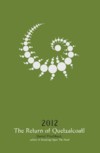Daniel Pinchbeck, "2012: The Return of Quetzalcoatl"

Pinchbeck takes as given that our world is heading toward a major shake-up, citing a rise in religious fundamentalism, a fever rush of technological advancements, and perhaps most importantly, the accelerated degradation of the biosphere. Pinchbeck's solution to the dilemma is for individuals to accept themselves as sentient aspects of a planetary ecology rather than alienated egos, using indigenous shamanic knowledge as a possible path toward that goal. Shamanism is also the subject of Pinchbeck's previous book Breaking Open the Head, which documents his personal evolution from a cynical New York atheist to someone who acknowledges a vast, hidden realm of spirituality.
His doubts are what give the book its spine, separating the flaky ideas from the important ones. Subsequently, not everything he uncovers is embraced with the same enthusiasm. He sees alien abductions as a vampiric process by which aliens use our collective unconscious to give themselves form. He's ambivalent about visionary Mayan scholar José Argüelles, whom he respects a great deal, yet he cannot ultimately embrace Argüelles' solution of reverting to a thirteen month calendar to solve the world's ills because it's not truly the Mayan calendar Argüelles proposes, but rather one from his own imaginative ego. Crop circles are another ambiguity for Pinchbeck. While some of the people he speaks to when visiting Glastonbury are adamant that the formations are entirely man-made, a belief the media is more than happy to propagate, Pinchbeck feels an overpowering energy when he steps inside them himself while other experts point out that many of the shapes created suggest geometric solutions not found in any textbooks.
That he manages to relate this many disparate subjects is commendable, but what makes his research compelling is how he presents it alongside his own personal crises which motivate him to find answers to these mysteries, giving the book an underlying narrative that contextualizes his thoughts and theories. It's not an egotistical stylistic device, either. If anything, he portrays himself as dysfunctional, if not pathetic, in his personal relationships, perhaps humbling himself for his role as a messenger of the divine.
Quetzalcoatl itself enters the story when, during a trip to Brazil, it starts sending Pinchbeck communications that culminate in a missive included in the book. At first I wasn't sure how to take this episode. He mentions Terence McKenna's "cosmic giggle" from a similar experience several times throughout the book, and I wondered if the despair in Pinchbeck's personal life made him yearn to place himself within a similar messianic lineage, but ultimately I believe that his experience was genuine. His troubles, if anything, make him a humble avatar for Quetzalcoatl's message.
To cover his bases and to some extent legitimize his effort to those who find belief in anything intangible a troubling subject in itself, he cites an extraordinary number of authors, philosophers, and experts like Carl Jung, Nietzsche, Rudolf Steiner, Martin Heidegger, Walter Benjamin, Fritjof Capra and Black Elk. Scholarly but never tedious, he weaves these threads into an impressive tapestry that finds clever and intriguing associations, giving his speculations a weight and depth far beyond the expectations for a book espousing esoteric wisdom. At times the text can get a little abstract or even digressive, but he always strings the subject back to his point, clarifying and refining it through examples. I was a little disappointed in the way he handles the Book of Revelations, giving in to the text's numerological conceits without mentioning that much of the numerology was actually mathematical code substituted for the names of political leaders in order to avoid persecution. However this is a very minor objection to a fascinating book. While not proscriptive in the least, Pinchbeck does his part to prepare us the best he can for the changes to come, whatever form they may take.



